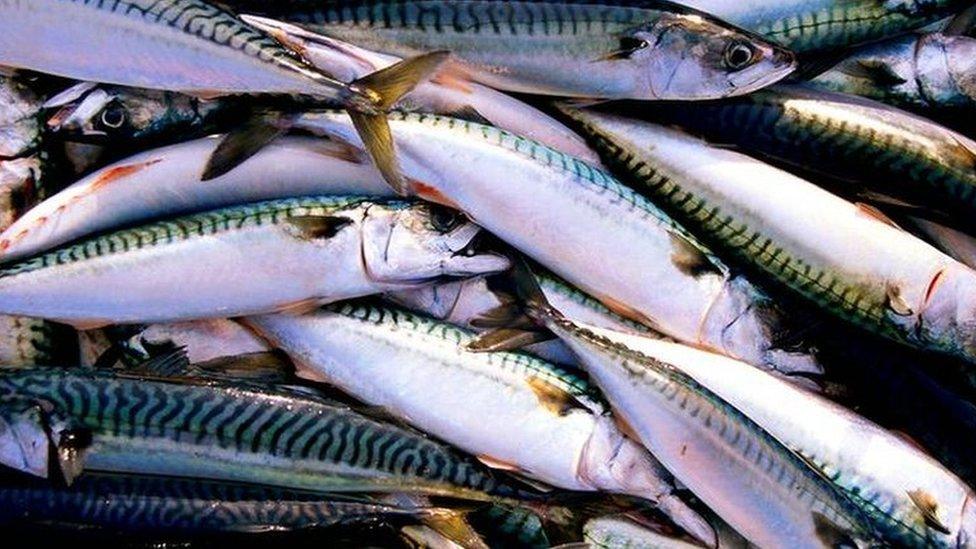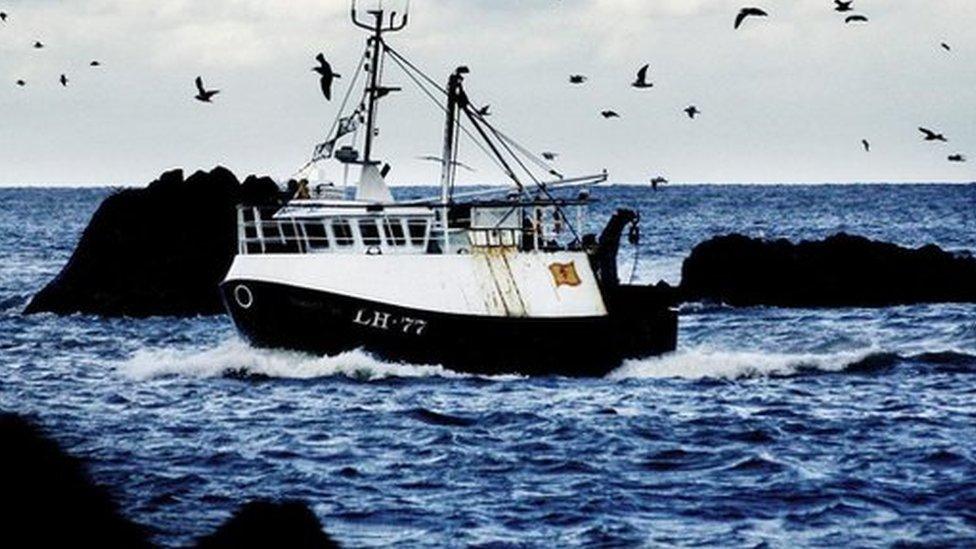Brexit: sea of opportunity or discarded overboard?
- Published

Fishermen ought to be pretty pleased. Theirs is one industry that got the result it wanted on 23 June.
No more Common Fisheries Policy. No more decisions on quota decided by a ministerial carve-up including several landlocked countries.
The plucky British skipper would push the giant Spanish armada corporation from the quayside, and claim back a colossal tonnage of catch quota.
However, it's not looking quite that simple. The industry is having to lobby vigorously to avoid being squeezed out of the picture in negotiations over future relations between the European Union and United Kingdom.
Bertie Armstrong of the Scottish Fishermen's Federation (SFF) was lobbying Brexit Secretary David Davis last Friday. It was the Commons' Scottish Affairs select committee on Monday. Then the UK Environment Secretary and Scottish ministers on Wednesday.
This is not to gloat about the result, even though the emphasis is on "the sea of opportunities" out there for fisheries.
No, this is more about the squalls of risk that the position on quotas that has built up since 1973 is used as the baseline on which to allocate post-Brexit catches.
Paella
To explain, the SFF was founded that year, which is - probably not coincidentally - the year the UK joined the European Economic Community.
The negotiation stance was privately (then, not-so-private now) that fisheries were "expendable". That is, Britain had higher priorities. Its interests could be sacrificed.
That was when it was negotiating with the six founding members of the European Union. It was before Spain joined, bringing with it a determination to protect access to the ingredients of paella.
The rest has been an unhappy history of a shrinking British fleet - not helped at all by over-fishing.
Quota has been negotiated away, and much of it sold to foreigners - so much so that a recent study from the University of the Highlands and Islands found 58% of fish caught in UK waters was landed by non-UK EU boats.
That was, across the averages of 2012 to 2014 - 650,000 tonnes of fish, or £408m worth. Of that, 386,000 tonnes were from Scottish waters, or £210m-worth. That was 51% of the catch from Scottish waters.
There was some traffic in the other direction. British boats are allowed to fish in other countries' waters and in the same years of this study, they landed an average 90,000 tonnes, worth £103m.
That story about the demon Common Fisheries Policy was prominent in the referendum 'Leave' campaign. You may recall the most absurd day of all was the Thames flotilla, in which 'Remainer' Sir Bob Geldof, with a megaphone, was filmed hurling abuse across the Thames at the 'Leave' boats.

So is that huge foreign catch of British fish to be reclaimed? Are British skippers really going to take back control? British fish for British fishermen?
Well, maybe not. There are negotiations to be had. They start in December. That is the first of at least two sets of annual quota talks before Brexit removes Britain from the room, and puts it into the same EU negotiations as Norway and Iceland.
What chance is there that the interim arrangements are going to be agreed to Britain's satisfaction? It could be an early test of what EU hardball looks like.
Beyond that, the talks on future arrangements are much more difficult than they were in the early 1970s. No longer a union of six countries, 27 capitals now have their shopping list of priorities. Not many will include fish. But some will.
If there is to be an EU-UK deal, they will all get enmeshed in exceptionally complex negotiations - talks in which other industries will have more clout than the fisheries minnow.
The sector represents only 0.3% of the UK economy. Its workforce is not large. And its political influence is focussed on very few constituencies.
Deeply frustrated
The complexity of such talks is underlined by the kiboshing of the EU-Canada trade deal by the people of Wallonia. The Belgian region has turned out to have an effective veto. If they don't approve it, the Belgium prime minister says he can't sign up.
That carries a message about democratisation of trade deals, at a time when the popular sentiment is that they have become a carve-up for multi-national corporations.
But if the Walloon veto is sustained, it also means that trade deals are going to become much more difficult to achieve. And that ought to be of particular concern to the United Kingdom, which is gearing up for a lot of trade talks.
The Walloon veto offers the lesson to UK negotiators that blocks on a deal can come not just from 27 member states but - in the anomalous case of Belgium - from a part of one of them. It makes the task of EU trade commissioner all but impossible.
With the Scottish government "deeply frustrated" at the signals it is getting from Downing Street about the role of devolved administrations in all this, it will also be a signal to EU negotiators on Brexit that the asymmetric complexities of UK politics could make it a difficult negotiating partner.